How Inflammation and Immobility Slow Us Down Before and After Surgery
Inflammation is most obvious when you see a swollen ankle or redness around a cut or sore. If it were all this apparent and uncomfortable then we would have more motivation to do something about it. When it is too small for the eye to see, we have a hard time imagining that same process going on in our joints, our intestines, our nerves, brain, etc. Autoimmune diseases are more and more prevalent, and that is an extreme microscopic and molecular version. The more subtle and insidious inflammation is only seen after years and years of slow erosion on our bodies.
For the 10 millionth time, our food intake and sedentary lifestyle are harmful, but now it’s going to cause YOU big problems in surgery
Our food choices and sedentary lifestyle are the top culprits. The fat in obesity secretes chemicals that cause low grade reactions of the organs it surrounds, and send chemicals through the blood and lymph to other places like the brain. Yuck, that sounds terrible, and it is. The food we eat has a lot of chemicals to make sure that it can be mass produced and mass ingested, which has effects near and far in our bodies. There is more and more research and understanding about the effects of our lousy American diet low in fiber and high in sugar causing Alzheimer’s, leaky gut, and type 2 diabetes, among numerous other problems. ALL OF THIS causes more surgical disease AND surgical complications.
Inflammation, our ability to move, and how that affects the whole surgical patient
One of the biggest effects of inflammation on our bodies and surgical results is its impact on mobility. The inflammation seeps into cells of our joints, ligaments, and muscles. Mobility of our bodies is associated with quality of life, overall health (physical and emotional), and successful aging. This association is BEFORE we add in the limitations of disease, injury, surgery, and surgical recovery to treat the disease or injury. When it comes to mobility and surgery, you might think that it’s only important from an orthopedic standpoint. And sure, regaining mobility after musculoskeletal injury and surgery is the goal, but your muscle mass, strength, coordination, and agility correlate with your outcome after ANY TYPE OF SURGERY. Examples include:
Decreased mobility is associated with delirium in patients having major abdominal surgery.
Preoperative mobility levels are associated with quality of life and delirium after heart surgery.
Gynecological surgery affects mobility in elderly population for more than 6 weeks after surgery and takes up to 6 months to normalize.
Because surgery causes pain, and pain may lead temporarily to decreased mobility, it is important to enter surgery with a solid base of agility. From a surgical recovery standpoint, however, mobility is even more important for preventing life-threatening complications such as pneumonia and deep vein thrombosis. When patients lie in bed too much after surgery, bad things happen, regardless of the type of surgery a person has. Conventional ways to improve mobility include basic exercise like walking or biking, or a more formal modality such as physical therapy to control pain and minimize any limitations the patient may have is important before and after surgery.
For the best outcomes, however, we need to integrate the best of eastern and western therapies. Here are some ideas:
targeted massage addresses the uneven distribution of stress in muscles,
lymphatic work promotes proper drainage from organs and joints and muscles,
chiropractic adjustments realign the skeletal system,
acupuncture reduces inflammation and pain,
dietary changes and use of supplements reduce inflammation,
specific gut probiotics promote protein production by the intestinal bacteria that in turn improves systemic inflammation that affects joint and muscles,
meditation and hypnosis decreases pain, and
psychotherapy adds the platform of emotional health in the setting of stress, failure to regain mobility.
Each therapeutic modality improves the efficacy of another which in turn improves function of the mind, body, and spirit. If this seems overwhelming, and it would be to me, consider speaking with our surgical wellness doula. Feel seen, heard, and supported the way you need to be. Available an hour at a time, or with our Surgery Reset Program package.
